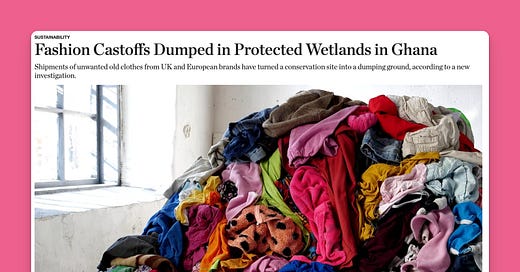Cache Flow #29: Fashion News Roundup
June 14-20: This Week in Fashion x Tech x Resale News
In this weekly series, we feature a roundup of the latest news in fashion x tech x resale.
Cache is your personal resale assistant, designed to make resale frictionless, profitable, and sustainable.
Cache automatically scans your purchase receipts from email to surface what you own.
Using AI-driven insights, Cache helps you understand market value and allows users to list items for sale with a single click.
We’re transforming resale from a hassle to a habit. Join our waitlist to experience the future of resale.
The internet is having a field day over Ryan Murphy’s upcoming series about Carolyn Bessette-Kennedy due to the lacklustre costumes: Many fans felt the costumes strayed too far from Bessette-Kennedy’s minimalist, polished style. Viewers criticized details like ill-fitting silhouettes and off-brand accessories, arguing that the wardrobe failed to capture her iconic fashion sensibility. The controversy underscores how essential accurate costuming is in portraying real-life style icons, especially when their image is central to their cultural legacy.
The rise of luxury resale has led to a parallel surge in sophisticated counterfeits: Platforms like Vestiaire Collective are ramping up efforts to combat this, combining AI tools with human expertise and collaborating closely with major brands. Despite these measures, counterfeiters continue to evolve, exploiting gaps in scale and technology. No system is foolproof, highlighting the ongoing arms race between resale platforms and fraudsters.
Ellen Hodakova Larsson, founder of Hodakova, is being considered as the next creative director of Marni: The news comes following Francesco Risso’s departure, leveraging her critical acclaim after winning the 2024 LVMH Prize. The Swedish designer has built a reputation for sculptural tailoring and a strong upcycling ethos, transforming deadstock materials into striking pieces—such as dresses made from zippers or antique spoons—earning attention from both celebrities and the industry. With Marni poised for a creative transition, Larsson’s emphasis on craft, sustainability, and independent authorship aligns with the evolving values driving fashion-house appointments today.
Nuuly has emerged as the clear leader in the U.S. apparel rental space: The platform now boasts more than twice the active subscribers of its nearest competitor, Rent the Runway. Backed by Urban Outfitters, it benefits from cost-effective sourcing, with around 45% of inventory coming from sister brands like Anthropologie, Free People, and Urban Outfitters. The company recently posted year-over-year sales of $124.4 million—a nearly 60% increase—and impressive retention rates of roughly 90% in year one and 40% over years three to five.
Mango has partnered with Circulose—formerly known as Renewcell—to integrate recycled cotton-based CIRCULOSE® pulp into its production chain: This next-generation material, created through a chemical process from discarded cotton-rich textiles, enables the brand to replace virgin fibers like wood pulp or new cotton while maintaining quality and traceability. The alliance aligns with Mango’s ambitious goal to exclusively use lower-impact fibers by 2030 and strengthens its broader sustainability strategy, which includes innovation, circular design, supply-chain decarbonization, and worker well-being. Both parties hope this scalable partnership sets an example for the wider industry and supports Circulose’s aim to reactivate its production capacity.
Large quantities of discarded second-hand clothing from UK and European brands are being dumped in and around Ghanian protected wetlands: The clothing is coming from brands such as Marks & Spencer, Primark, H&M, Zara, Next, and George at Asda and the discarded clothing is severely impacting waterways, beaches, local fishing, and endangered wildlife. Accra’s overloaded Kantamanto market processes over 1,000 tonnes of used clothes weekly, but limited waste infrastructure means roughly 70 tonnes per day go uncollected—clogging natural habitats or burning in unregulated dumps. Although some brands support take-back schemes and Extended Producer Responsibility laws, local activists argue that stronger international regulations and enforcement are urgently needed.
Women now control $31.8 trillion in global spending and are projected to account for 75% of discretionary spending by 2028: This economic power is reshaping brand loyalty dynamics, with women increasingly favoring brands that demonstrate authenticity, inclusivity, and shared values. Brands that fail to align with these expectations risk losing consumer trust and loyalty. Brands need to engage with women as informed and discerning consumers, prioritizing transparency and genuine connections over traditional marketing tactics.
Alta has raised $11 million in seed funding led to launch its AI-powered personal styling and shopping app: Founded by former tech engineer Jenny Wang, The app lets users digitize their wardrobe, create outfits with new pieces, and receive recommendations tailored to events, weather, and lifestyle—bringing to life the iconic closet tech from Clueless. The round was led by Menlo Ventures and includes investors like LVMH’s Algaé Ventures, Anthropic’s Anthology fund, and angels including Tony Xu and Karlie Kloss. The funding will help scale the team, refine the tech, and build partnerships with major fashion players and influencers.
Have thoughts/opinions/questions on any of the above? Let’s discuss! Join the conversation at the link above.
With love and hot girl energy,
Cache 💚















❤️❤️❤️❤️